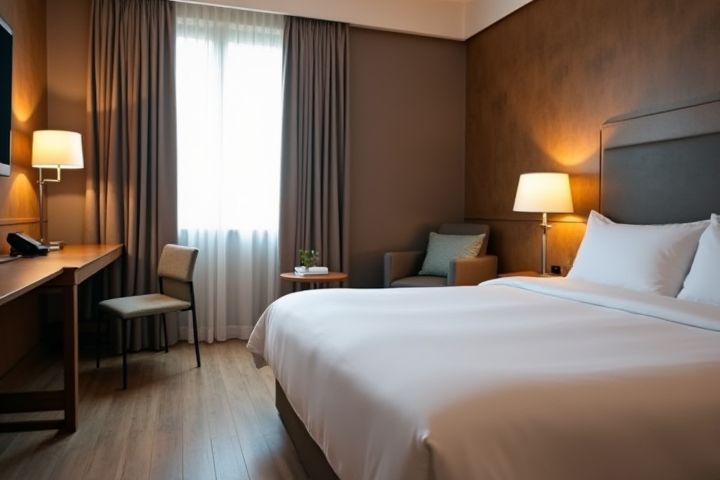
The hotel industry in Nigeria has experienced significant growth, driven by increasing domestic and international tourism. Major cities like Lagos, Abuja, and Port Harcourt are home to numerous upscale hotels and boutique accommodations, appealing to both business and leisure travelers. Nigeria's rich cultural heritage and vibrant festivals attract visitors year-round, boosting demand for hospitality services. Additionally, the rise of online travel agencies and booking platforms has made it easier for customers to find and reserve accommodations tailored to their preferences. Investing in sustainable practices is becoming a priority for hotels, as travelers increasingly seek eco-friendly options during their stays.
Diverse accommodation options
The hotel industry in Nigeria showcases diverse accommodation options ranging from luxury hotels to budget-friendly lodgings, catering to various traveler preferences. Luxury establishments, such as the Eko Hotel and Suites in Lagos, offer world-class amenities and services, ensuring a premium experience for high-end tourists and business travelers. In contrast, guest houses and budget inns provide affordable and comfortable alternatives for backpackers and budget-conscious visitors, reflecting the country's hospitality. As Nigeria's tourism sector continues to grow, the increasing demand for unique and varied accommodations highlights the importance of adapting to the evolving expectations of both domestic and international guests.
Rapid urbanization impact
The hotel industry in Nigeria is experiencing significant growth due to rapid urbanization, particularly in major cities like Lagos and Abuja. This urban expansion leads to increased demand for accommodation, with both local and international travelers seeking high-quality services and amenities. The rise in population density contributes to a surge in business trips, tourism, and events, emphasizing the need for modern hotel facilities. Embracing sustainable practices and technology can enhance customer experience, placing hotels at the forefront of Nigeria's urban development.
Influence of local culture
The hotel industry in Nigeria significantly reflects the country's diverse local culture, shaping guest experiences through architecture, cuisine, and service styles. Traditional Nigerian art and design elements are often incorporated into hotel interiors, creating an authentic atmosphere that highlights the nation's rich heritage. Local dishes, such as jollof rice and egusi soup, are frequently featured on menus, providing visitors with a true taste of Nigeria's culinary landscape. By embracing and promoting local cultural elements, hotels enhance their appeal to both domestic and international travelers seeking an immersive experience.
Growing domestic tourism
The hotel industry in Nigeria is experiencing significant growth, largely driven by an increase in domestic tourism, as more Nigerians explore their own country's diverse attractions. This shift is fostering the development of various accommodations, from luxury resorts in Lagos to eco-lodges in national parks like Yankari and Cross River. Investment in hospitality infrastructure is boosting local economies, creating jobs, and enhancing the overall travel experience for locals and international visitors alike. Emphasizing cultural heritage, culinary experiences, and adventure tourism, the sector is poised to transform Nigeria into a premier travel destination in West Africa.
International chain presence
The hotel industry in Nigeria is experiencing a significant shift towards the presence of international hotel chains, driven by growing tourism and business travel. Major brands, such as Marriott, Hilton, and Radisson, are establishing operations in key cities like Lagos and Abuja, enhancing the overall hospitality landscape. This influx not only increases accommodation options but also elevates service standards, creating competitive pricing strategies. Travelers benefit from the familiarity and reliability of these global brands, ensuring a consistent quality of experience throughout their stay.
Government regulations
The hotel industry in Nigeria is significantly influenced by government regulations, which aim to ensure safety, hygiene, and quality standards across establishments. These regulations encompass licensing requirements, fire safety protocols, and health inspections, which all contribute to a more secure environment for guests. Compliance with the Nigeria Tourism Development Corporation (NTDC) guidelines can enhance your hotel's reputation and operational efficiency. As the government continues to promote tourism growth, adherence to these regulations is crucial for attracting both local and international travelers.
Infrastructure development
The hotel industry in Nigeria is experiencing a significant transformation driven by infrastructure development, which enhances both guest experiences and operational efficiency. Investment in modern facilities such as state-of-the-art conference centers, luxurious accommodations, and improved transportation networks is attracting both domestic and international travelers. This boom in infrastructure not only stimulates economic growth but also creates numerous job opportunities within the hospitality sector. As your hotel adapts to these advancements, you can expect increased occupancy rates and higher customer satisfaction.
Seasonal variations
The hotel industry in Nigeria experiences significant seasonal variations influenced by local and international events, as well as climate changes. High-demand periods often coincide with major festivals, holidays, and tourist attractions, which create lucrative opportunities for hotel operators. Conversely, off-peak seasons tend to see a decline in occupancy rates, necessitating strategic pricing and promotional offers to attract visitors. Understanding these seasonal trends can help you optimize revenue and improve guest experience throughout the year.
Online booking trends
The hotel industry in Nigeria is experiencing a significant shift towards online booking trends, driven by an increasing smartphone penetration and internet accessibility. Customers are now prioritizing convenience and flexibility, with many preferring to compare prices and amenities online before making reservations. Platforms such as Hotels.ng and Booking.com are becoming pivotal, enabling users to easily access a wide range of accommodations from luxury hotels to budget lodges. Your engagement in online marketing strategies can further enhance visibility and attract more bookings in this competitive landscape.
Security and safety standards
The hotel industry in Nigeria emphasizes stringent security and safety standards to ensure the well-being of guests and staff. Establishments implement advanced surveillance systems, secure access controls, and trained security personnel to mitigate risks. Regular safety audits and compliance with local regulations foster a secure environment, enhancing guest confidence in their lodging experience. This focus on security not only uplifts the reputation of Nigerian hotels but also contributes to the overall growth of tourism in the country.
